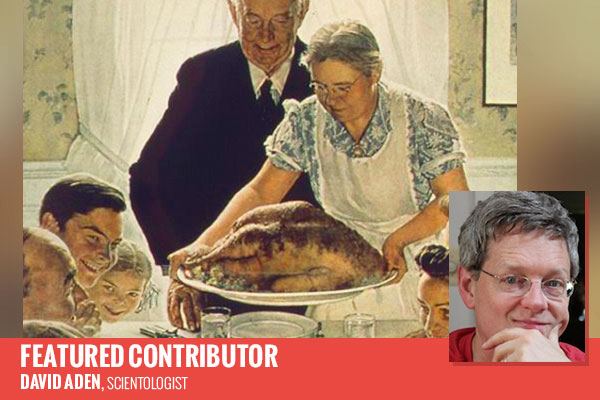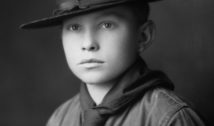
How One Scientologist Celebrates Thanksgiving
- By David Aden --
- 23 Nov 2016 --

Featured Contributor David Aden describes how the meaning of Thanksgiving changed for him after becoming a Scientologist.
People are often curious about the cultures of religions not their own—for example, in my case, whether and how Scientologists view Thanksgiving. I can’t speak for all Scientologists, but I can describe how I think about it.
How One Scientologist Celebrates Thanksgiving[/tweetthis]
For practically everyone in America, conversations during the run-up to Thanksgiving focus on time off work, cooking, football and Black Friday specials. But it’s everyone together around a table that will be for our family, like many others, the highlight.
This will be the first Thanksgiving for me without either of my parents, who both passed away this year, and it is a year when complaints in popular culture about the year itself couldn’t be more negative or shrill. In light of personal and world events, taking a moment to remember the things for which we are thankful couldn’t come soon enough.
I didn’t always feel that way. When I was a teenager, I was embarrassed and irked by my father’s tradition of having to name something for which each of us was thankful before we could dig in. As I grew older my view changed, in part due to the simple passage of time, but even more thoroughly when I became a Scientologist.
Thanksgiving no longer represented just an acknowledgement of the receipt of others’ gifts, it is also the promise of positive things to come. Of course no one can be guaranteed an unencumbered existence. No one can prevent or defend against all accidents or problems. But neither are we poor victims of every random gust.
For me, the foundational understanding in Scientology—that we are spiritual beings first and inhabitants of mortal shells second—means we have a causative, responsible relation to the world.
So, Thanksgiving may begin with giving thanks. It starts, in the company of those most important to us, with a long-enough pause in daily life to remember and reaffirm those people, actions and purposes to which we owe a heartfelt “thank you.”
But Thanksgiving continues, at least in spirit, when we focus our attention on those thanks-deserving things we’d like to both receive and give. We can and do make a difference to our loved ones, to the world around us and to the way our lives unfold.
I’ll enjoy the turkey and the pies, the family and the football. I’ll probably even leverage the Black Friday sales. But when the dishes are clean and the leftovers consumed, I know that those thanks-worthy things recalled on Thanksgiving will continue to a large measure throughout the year only when I remember them and continue to imbue them with life.
The Way to Happiness by L. Ron Hubbard is a small book that embodies the understanding that we make a difference in the world around us. Mr. Hubbard, the Founder of Scientology, wrote it as a nonreligious moral code that articulates ways we can help others improve their lives and in so doing gain the happy side-effect of improving our own lives:
One can feel at times like a spinning leaf blown along a dirty street, one can feel like a grain of sand stuck in one place. But nobody has said that life was a calm and orderly thing: it isn’t. One isn’t a tattered leaf nor a grain of sand: one can, to greater or lesser degree draw his road map and follow it.
…
While no one can guarantee that anyone else can be happy, their chances of survival and happiness can be improved. And with theirs, yours will be.
So Thanksgiving has become for me an opportunity to not only be thankful for those things we have received but to also recommit ourselves to those things we’d most like to give.



















